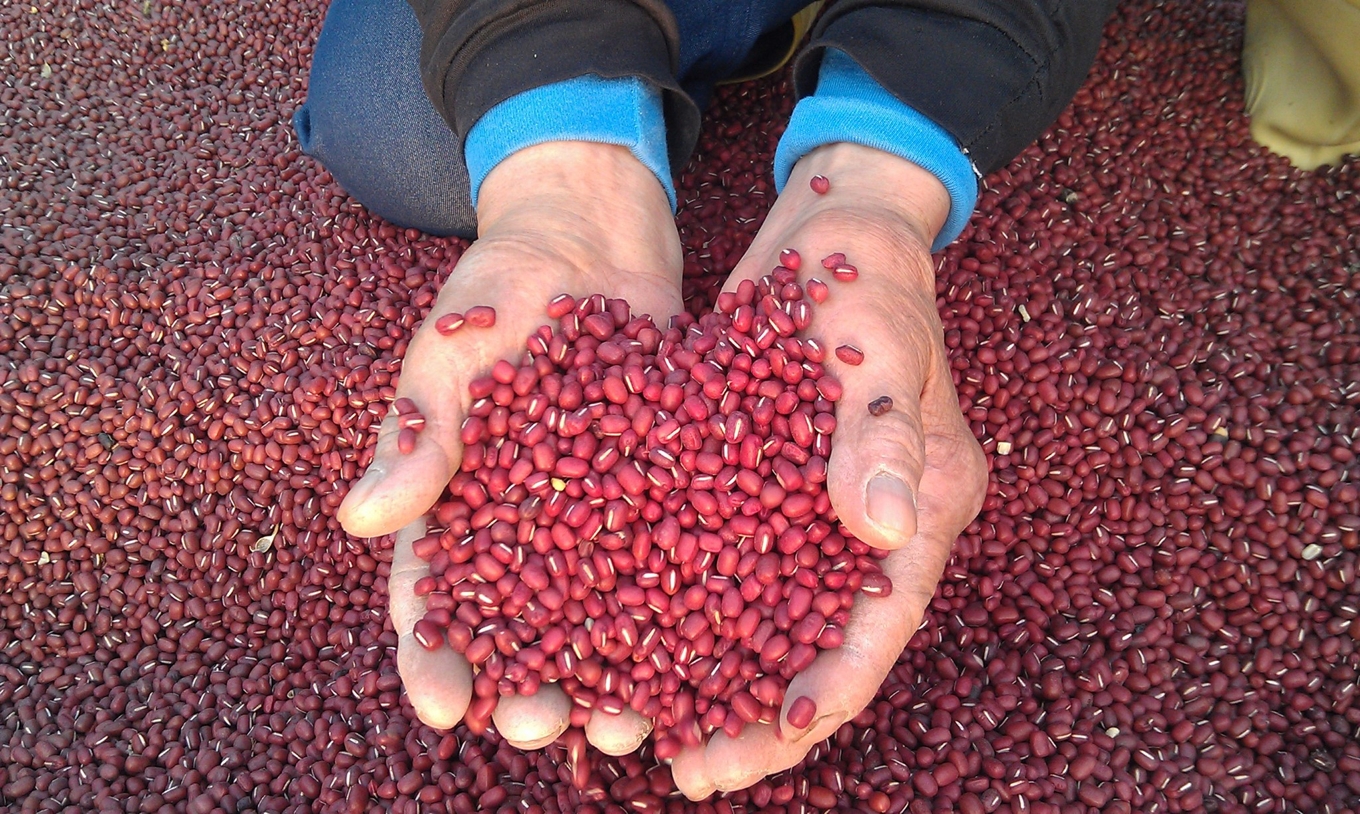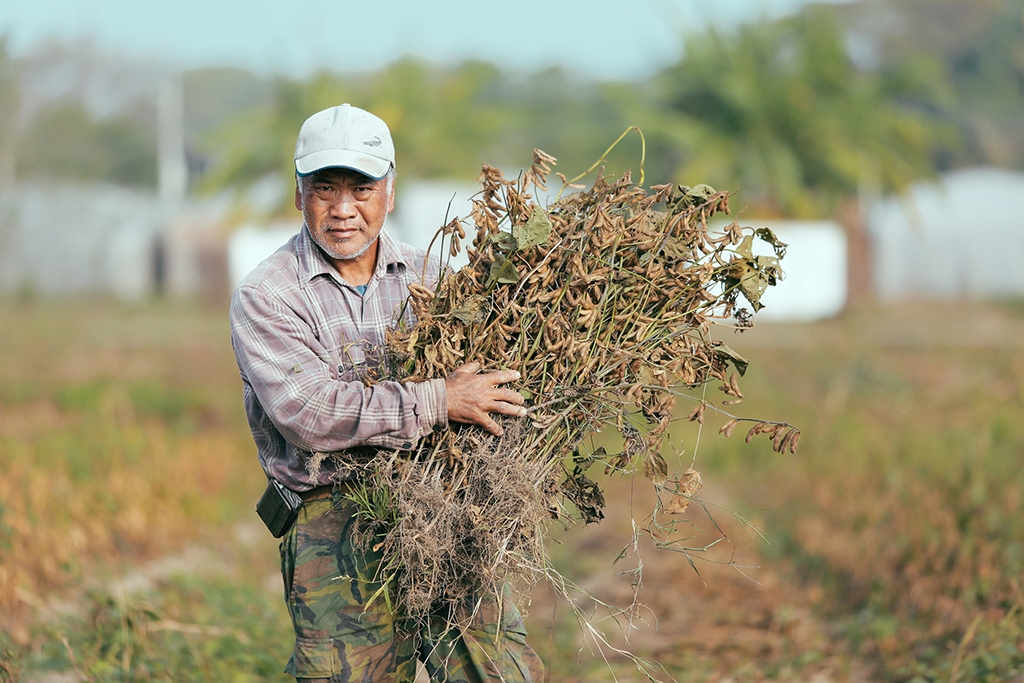Herbicide spray red bean 02 "paraquat has come to fix the weeds and wash away the stigma of the red bean industry, adding more variables to the transformation road."
0 sharing
Four months after the prohibition of the herbicide paraquat, the Ministry of Weifu announced on May 20 this year that the herbicide as a defoliant for red bean was opened, which was mobile and highly water soluble after spraying on the plant. Improper application will damage the soil and water environment and affect food safety, sparking discussions in the agricultural community.
In the past, in order to replace paraquat, the government has vigorously promoted the more friendly materials ── nonanoic acid and sodium chlorate. When the herbicide enters the red bean industry, will these friendly materials be excluded?. Originally strive to wash "eat red beans with herbicides" stigma of the red bean industry brand, how will it develop? And how should consumers protect themselves?


Red bean is an important food crop in Taiwan (Photo / Cai Jiashan) banning paraquat has caused a high degree of controversy, but opened up to kill weeds when it quieted down.
The herbicide paraquat was approved and registered in 1968 and was completely banned in 2020. It has led the way in rural Taiwan for more than half a century. In addition to weed management, the red bean industry used to be highly dependent on paraquat, because after agricultural mechanization, harvesting red beans needed to be harvested in conjunction with a bean harvester, and the Council of Agriculture approved paraquat as a defoliant for drying red bean plants in 2011.
For farmers, paraquat has fast efficacy, cheap price and fast decomposition, and has little impact on the environment among many herbicides, so it is an incomparably useful weed control weapon, but it is also because it is highly toxic and easy to obtain, and seriously endangers the lives of the people. on this grounds, the Council of Agriculture decided to let paraquat disappear in Taiwan and announced that it would be completely banned on February 1 this year.
In order to replace paraquat, the government has actively promoted nonanoic acid and sodium chlorate as defoliant for red beans in recent years, and some farmers have used urea and salt water as a non-pesticide as defoliant. The previous controversy caused by the ban on paraquat seems to have gradually subsided. Four months after paraquat was banned, the government opened up the use of herbicides for defoliation of red beans, causing an uproar in the agricultural community once again: "since we want to open up herbicides, why should we ban paraquat which is better to use?"
A Hong, a tall tree farmer, said: "before, when the government wanted to ban paraquat, farmers would go to the pesticide store to buy more, and people would worry that other herbicides were less effective and more expensive." Ah Hong's neighbor Gui Tsai, who is the boss of collecting guavas, has a kind of guava of his own. He raised the corners of his mouth and smiled and said, "Oh!" Paraquat is already easy to use, but as a result, people miss it even more as soon as it is banned. "


This is a non-pesticide method of defoliation with a mixture of urea and salt. The red bean plant is dry, but the weeds are still green. Love and hatred between Red Bean Industry and herbicides herbicide is difficult to remove hidden worries in red bean industry
Whether paraquat or herbicide, herbicides have become the savior of farmers, especially old ones, in today's rural areas with an aging population and insufficient manpower.
Zhang Zhengyang, president of Kaohsiung Banner Mei Community College, believes that herbicides symbolize the reality of the countryside. "every time I talk about this topic, the images that come to my mind are mostly old farmers, especially in the recent rainy season, when weeds grow so fast that farmers have to use herbicides." Although Zeng Qisan, a farmer in Meinung, does not use herbicides, he also understands the choice of the old farmers. "Young people have left home, and only the elderly take care of the fields. Herbicides are easy to use and save energy and time, so they become accustomed to it, and they can hardly do without it!"
When it comes to the relationship between the red bean industry and herbicides, Zeng Qishang, a red bean farmer in Meinung, is very impressed. He believes that the conditions of farmers will determine whether farmers choose to use herbicides as defoliants. "for example, my sister and I are both 50 or 60 years old, but we are still young and strong, and we have the manpower to cope with natural fallen leaves. Although there is a risk of rain and can endure a slower harvest, older farmers may not be able to do it."


Zeng Qishang used the method of natural fallen leaves to harvest red beans (Photography / Lian Weizhi) to save costs and pay the price, and herbicides tarnished the red bean industry.
The most weak point for farmers in various industries is that they are unable to set their own prices. in order not to lose money, farmers will try their best to control costs. The more they can reduce costs and risks, the more useful they are, and the easier they are to use, the more dependent they will be. Take a large can of paraquat of 3 liters as an example. If it is diluted 200 times as recommended by the Council of Agriculture, one hectare can be used to buy two cans at a cost of only NT $700 to NT $900.
However, good use is not only good, and invisible disadvantages may cause the red bean industry to collapse at any time. Li Jianhui, who returned to his hometown of Wandan in Pingtung eight years ago, is the son of the pesticide industry and became the brand chief executive of Eagle Red Bean four years ago. He believes that herbicides as defoliants do save costs and manpower, but it is also a major worry for the industry.
He explained, "whether paraquat or herbicide is a herbicide, as long as there is a herbicide, it is very disadvantageous to farmers. If you think about it, every year before the trader comes to buy red beans, as long as they say 'red beans are useful herbicides', once they appeal to the media to report the news, consumers are afraid, and the trader will have the opportunity to lower the trading price at the edge of the field. in this case, can the old farmer who cannot sell himself not accept the low price offered by the trader? "
Red bean farmers who do not use herbicides look for answers in tradition.
Zhu Zhengfu, a farmer in Meinong who has long worked with the Peasants' Association and the Kaohsiung Agricultural Reform Farm, planted 1.2 hectares of red beans last season. His red bean fields are the original and original fields of all red bean farmers in Meinung. Zhu Zhengfu says that he hasn't used paraquat as a defoliant for eight years. "I always use the traditional natural drying method. If there are shaded trees or slow-ripening plants in the field, I will use ammonium sulfate and edible salt to speed up plant drying." He stressed, "what I grow is the seed of the Meinong red bean industry, and the quality must be the best."
In Wandan Township, Pingtung County, there is a red bean strange woman, ── Chen Qianhua, who returned to her hometown six years ago to take care of her parents and her family's red bean fields. She believes that there are many ways to dry red beans, and herbicides are not necessary. sometimes she will pull out the plants and dry them naturally in the sun, and sometimes she will use urea and salt to speed up the defoliation. Chen Qianhua said: "even if I am scolded by my parents, I have to pretend not to hear it, and even if I am laughed by my neighbors, I have to pretend not to hear it. Now my production area has increased to nine cents of land, all of which are produced and sold on their own."
As for the 200-hectare red bean field of "Eagle Red Bean", it is also a natural way to harvest red beans. Li Jianhui said, "the red bean itself has a very good protective film and can be waterproof. If the damage is accelerated by artificial desiccant, it is not good to dry too much." He also further explained that in order to change the production mode of old farmers, we need a large amount of support from channels and consumers, and the industrial structure relationship between most single farmers and disk merchants is the reason why habitual farmers are unable to put down herbicides.

- Prev

Help the flower industry to revitalize Taichung Agriculture Bureau to integrate flower art into the campus
The flower industry in Taichung City is booming and its quality is well-known. This year, however, under the influence of COVID-19, export sales have been blocked. Taichung Municipal Bureau of Agriculture has successively held campus flower courses in order to revitalize the flower industry. at present, a total of 155 schools have signed up.
- Next

Spraying herbicide Hongdou 01 "the government opened the herbicide" solid weeding "as a defoliant for red bean, which impacted the food safety of the environment, and the agricultural sector approved the retrogression of the policy.
Spraying herbicide Hongdou 01 "the government opened the herbicide" solid weeding "as a defoliant for red bean, which impacted the food safety of the environment, and the agricultural sector approved the retrogression of the policy.
Related
- A course of planting techniques and methods on how to grow carrots
- How to plant the latest tulips?
- Is it better to pick tea in the morning or in the afternoon? When is the best time for tea to be picked? what is the third or fifth tea?
- Launch Yuanxiao Happy combination Haocha + Tea Yuan healthy Taste
- Penghu Tourism "Fireworks 20 Parade with You"
- 2022 West Lake Happiness holds "Digital Revitalization Voucher" and draws iphone13 and laptop.
- Banqiao Fuzhou social houses are designed to change start-up combined with police elimination to create a safe and livable environment
- The convenient measure of "mechanical weeding" in Xinbei has been abused and the Agriculture Bureau has imposed heavy penalties on the illegal land consolidation.
- Changgeng University Joins Hands with Four Memory Factories to Rescue Memory Talent Shortage
- The list of Taiwan's top 100 MVP managers is listed by the Director-General of the Farmers' Association of Sanxia District.

